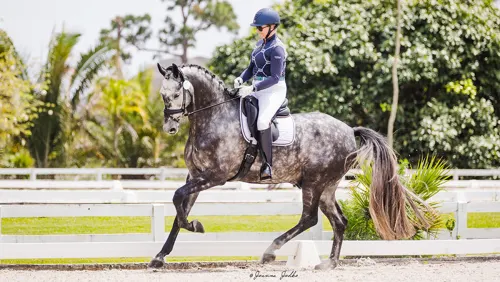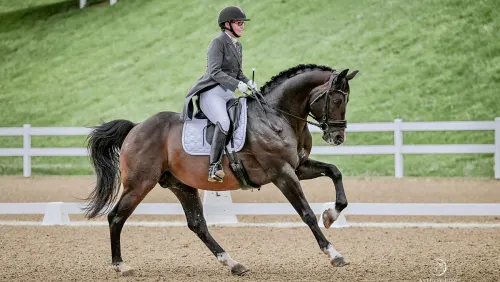I had a lot to digest on the long trip home after a recent Fédération Equestre Internationale five-star judges’ meeting in Hamburg, Germany. In addition to the in-house discussions and the tests to check and hone our judging skills, we had several other important issues to ponder. The FEI World Cup qualifier in Amsterdam, held in late January, came into focus because of some scathing reports from several journalists, mainly directed towards the judges but also very hurtful to the winner, Great Britain’s Lottie Fry on Everdale.
It is, of course, the duty of a journalist to tell the truth as he or she sees it and report on the facts, but there are ways you can do this without devastating the athlete or, as has happened in other cases, singling out one judge and taking this judge apart. Such an attack could be career-ending for an athlete or judge who is not mentally tough enough to stand up for themself. Being treated like a criminal when you are honestly making your best effort to do everything correctly can be crushing.
In the case of this rider, the reigning world champion since her victory on Glamourdale at the Blue Hors FEI Dressage World Championship in 2022 (Denmark), there is no great fear that she will give up riding, but it was a tough blow. The FEI took action by inviting journalist Jan Tönjes of the German magazine St. Georg to our meeting. He showed up, and I will give him credit for that, but seemed pretty confident that he got everything right in his criticisms of the Amsterdam CDI judging, and furthermore that he understands the basics of dressage and how to score a test a great deal better than any of the people in the room, including the group of judges that the FEI considers the best in the world. There was a strong pushback from the team of judges who stood by their decision and placings, but most of all we all wanted Lottie to know that we, as judges, support her and any rider who gets attacked by the press for winning.

Some years ago, I judged at a show in Stuttgart, Germany, organized by Gotthilf Riexinger, himself a five-star judge. He had experienced some criticism about the dressage judging from the local reporters, and he promptly invited several of them to sit in with the judges to feel what it is like to be in our hot seat. Gotthilf rotated the journalists in the boxes to give them a chance to experience the different angles of viewing and listen to as many of us as possible. After several FEI classes, we had a break, and it was interesting to hear the journalists express their surprise over the speed at which we had to evaluate each movement and the many features of every combination’s effort that had to be included in our evaluation. I know they went home a bit more appreciative of what goes into a judge’s work and our devotion to the task.
Bringing AI Into The Sport
ADVERTISEMENT
At the meeting, Daniel Göhlen, our IT genius who brought us the Black Horse One program for electronic judging and judges’ education, showed us the development of the use of artificial intelligence in our sport. He convincingly demonstrated how AI can evaluate the technical aspects of dressage, just as it presently is used in diving and gymnastics. The only aspect that IT cannot (yet) appreciate is the artistic side—harmony, suppleness, engagement, topline, mouth, tension or lack thereof. For this aspect we apparently need humans in the form of judges. But their influence can be further diminished by adding a portion of the spectator judging score to the final results.
All these are interesting ideas and look like they can be realized in a not-too-distant future. The only potential dilemma I can foresee concerns the most aggressive dressage journalists who may lose the availability of their favorite prey. Will they have to share their criticism between the robots and the spectators and the few remaining judges, or go in search of more fertile hunting grounds?
Welfare In The Spotlight
Another topic which has become even more relevant and troubling lately was central in many of the discussions: the welfare of the horse. With recent reports and videos from Denmark and the U.S. of actual abuse, we face a huge problem. Whatever punishments and corrections are put in place cannot fix the damage done to the animals involved, and there is no excuse for this horrid behavior. In addition, these revelations are threatening to the very existence of equestrian sport, which as a discipline has been on unsure footing with the Olympics for a long time already.
When I was a member of the FEI Dressage Committee under the chairmanship of Frank Kemperman, he often voiced concern about the possibility of equestrian becoming excluded from the Olympic Games. Not because of concerns about abuse of the horses, but because it is a huge and very expensive undertaking for the International Olympic Committee to build and provide all the necessary accommodations for the horses and their riders and entourage. At that time, the jumping provided the majority of spectators, but we had the freestyle to save the day for dressage. The FEI Dressage Committee made a number of adjustments in scheduling and tests to highlight the freestyle and make dressage more palatable to the IOC, and Frank was most proactive in making our sport attractive enough to keep it in the Games, although he sometimes kiddingly referred to it as “stressage.”
ADVERTISEMENT
These days we have a different stress to deal with: It started with the complaints about rollkur, then we dealt with the “blue tongue,” which attracted a lot of attention before the 2012 London Olympic Games, where I remember the constant clicking of cameras to catch any rider in the warm-up. Very few were admiring clicks, and I felt quite bad for some of the athletes who had to warm up in this sound of unfriendly fire. Ever since then, there have been pictures posted on social media by individuals who are not members of the press or experts on the subject depicting every difficult moment in the warm-up or a dressage test. Often it seems certain riders are persecuted because of some personal vendetta. This is more prevalent in dressage than any other discipline, and I often wondered why dressage was singled out for these attacks.
In February 2020 I was judging a CDI in Australia, and at the same time there was a seminar held where one of the presenters was Roly Owers, the chief executive of World Horse Welfare. In his talk I heard for the first time the expression “social license” as he explained to us that this is something that has to be earned for us to be allowed by our present society to continue to use horses for sport. This was a concept I really had to wrap my head around, because until then I was very defensive when anybody attacked dressage, always pointing out our close and long-lived partnership with our horses, and surprised that we were picked out as scapegoats. Looking out from our micro world of equestrian sports, I naively assumed that people in general accepted and even approved of our use of horses in sport and supported the concept in principle even if they were not personally involved.
Mr. Owers listened patiently to my protesting and then he explained that today’s society, particularly in urban areas, consists of a large percentage of people who have never seen a horse up close, have no idea of what they are used for and would probably be frightened if one came too close. If we are not extremely careful, all those people who hear any bad news of any kind about our sport will take this to heart, and unless there is positive information to refute it, their opinion of what we do with horses will be forever tainted. As a matter of fact, he said, if we want to be allowed to continue to ride and drive equines, we had better start to promote our sport to all the people who know nothing about horses. If we do not go out and spread the word about the benefit and beauty of the relationship between man and horse, the negative forces who are already on a mission to ruin all horse activity will get their message out first. And then it is too late.
Thus Mr. Owers gave me a major half-halt on the subject, and later at dinner he reinforced his opinion by telling me how difficult it was at times for his group to work the opposite side of the problem, when trying to convince people in rural areas who make daily use of their horses and mules and oxen to treat them as a living beings and not a commodity. Since then, I have listened to several lectures on the threat to our assumed “right” to use horses for our own purposes, whether it be sports or pleasure, and I now realize the danger is real.
The U.S. Equestrian Federation, after introducing “social license” to its members at its 2023 annual meeting, again focused on this topic at its annual convention in January. While we may have thought previously that we promote our sport by training and riding properly, keeping our horses sound, healthy and comfortable for many years and at times being successful in competition, we were dreaming. All that will not override the negative perceptions unless we actively promote and explain the purpose and beauty of dressage to people outside of our community.
Anne Gribbons was the U.S. Equestrian Federation technical advisor for dressage from 2010-2012. She has trained and shown 18 of her own horses from start to showing at Grand Prix and competed in 10 national championships and in Europe, including the Aachen CDIO (Germany). Seven of her horses have been named U.S. Dressage Federation Horse of the Year, and she was a member of the 1995 Pan American Games silver medal-winning team for the United States. Anne is a Fédération Equestre Internationale five-star judge, and a USEF “S” and “R” Sport Horse Breeding judge. She has officiated at numerous CDIs worldwide, including four FEI World Cup Finals, three European Championships and two FEI World Equestrian Games. She was the head of the ground jury at the 2017 Omaha World Cup Finals and the 2018 Tryon WEG and officiated at the 2022 World Championships in Herning, Denmark.
She was a member of the FEI Dressage Committee from 2010-2013, and she was inducted into the Roemer Foundation/ USDF Hall of Fame in 2013. In 2018 she was awarded the USEF Walter Devereaux trophy for sportsmanship. She started contributing to Between Rounds in 1995, and a collection of those columns is now available in the book “Collective Remarks.” She and her husband David have owned and operated Knoll Farm on Long Island and Knowll Dressage in Orlando, Florida, for over 50 years.














